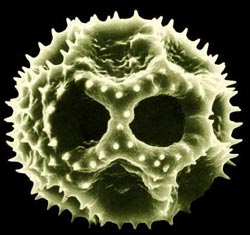Researchers have a nose for how probiotics could affect hay fever

This is pollen from a dandelion.<br><br>Credit: Mary Parker, Institute of Food Research<br>
However, it did not lead to significant changes in hay fever symptoms, although this challenge test may not have accurately represented natural allergen exposure.
Our immune system must distinguish between “friends” that can be beneficial to our health and “foes” that can have harmful effects. There is now a growing body of evidence that the gut microbiota, the trillions of bacteria that live in our gut, influences that recognition. When it fails an immune response occurs. This is the case with hay fever, or seasonal allergic rhinitis, when the immune system reacts to pollen or fungal spores.
Previously, a research team at the Institute of Food Research (IFR) found that taking a drink containing the probiotic bacterium Lactobacillus casei changed how our immune system responds to grass pollen, measured through changes in molecules produced by the immune system.
A new study, published in the journal PLOS ONE, shows for the first time how these probiotics can interact with cells in our gut to produce systematic changes in cells lining our nasal cavity.
Funded by Yakult and the Biotechnology and Biological Sciences Research Council (BBSRC), clinicians and scientists at IFR and the University of East Anglia (UEA) on the Norwich Research Park gave 60 hay fever sufferers daily drinks for 16 weeks, outside of the hay fever season. One group was given a drink containing Lactobacillus casei Shirota, and the other group received very similar drinks without the probiotic. The study was double-blinded and placebo controlled, so neither the volunteers nor the scientists knew which group was receiving the probiotic. Samples were taken from the volunteers' nasal cavities and blood, both before and after being challenged with pollen to trigger their allergy. This was then repeated at the end of the 16-week intervention. Clinical measurements of the symptoms of hay fever were also recorded.
Volunteers who received the probiotic drink saw changes in allergic inflammation in their nasal lining, as well as changes in their blood, that are associated with immune responses. This is strong evidence of how the gut microbiota can influence cells of the gut lining, and have a systematic influence on our bodies and distant cells, such as those lining our nasal passages. But despite this, the probiotic had no detectable effect on the symptoms of hay fever.
Hay fever is a complicated condition to assess, and mimic in a clinical setting. The researchers used a single allergy challenge, applied to the volunteers' nasal passage, to provide a standard, reproducible test to help ensure all the subsequent results are comparable. In the real world hay fever is usually triggered by longer term exposure to the allergen, variable in strength and timing over a period of days or weeks. The IFR researchers are now exploring the possibility of carrying out a seasonal study to investigate whether the changes in the nasal mucosa seen in this single challenge study relate to changes in hay fever symptoms triggered by a more realistic natural exposure to pollen.
Reference: Oral Delivery of a Probiotic Induced Changes at the Nasal Mucosa of Seasonal Allergic Rhinitis Subjects after Local Allergen Challenge: A Randomised Clinical Trial, PLOS ONE DOI: 10.1371/journal.pone.0078650
Media Contact
More Information:
http://www.nbi.ac.uk/All latest news from the category: Studies and Analyses
innovations-report maintains a wealth of in-depth studies and analyses from a variety of subject areas including business and finance, medicine and pharmacology, ecology and the environment, energy, communications and media, transportation, work, family and leisure.
Newest articles

Properties of new materials for microchips
… can now be measured well. Reseachers of Delft University of Technology demonstrated measuring performance properties of ultrathin silicon membranes. Making ever smaller and more powerful chips requires new ultrathin…

Floating solar’s potential
… to support sustainable development by addressing climate, water, and energy goals holistically. A new study published this week in Nature Energy raises the potential for floating solar photovoltaics (FPV)…

Skyrmions move at record speeds
… a step towards the computing of the future. An international research team led by scientists from the CNRS1 has discovered that the magnetic nanobubbles2 known as skyrmions can be…





















